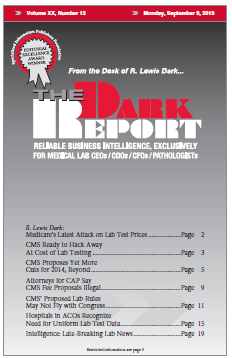CEO SUMMARY: In its comments about a proposal to change the way CMS pays for clinical laboratory and pathology services, the College of American Pathologists (CAP) said that CMS is using faulty assumptions. CAP further commented that the CMS proposal to cap physician fee schedule payments at the level of hospital outpatient department rates violates …
Attorneys for CAP Say CMS Fee Proposals Illegal Read More »
To access this post, you must purchase The Dark Report.


